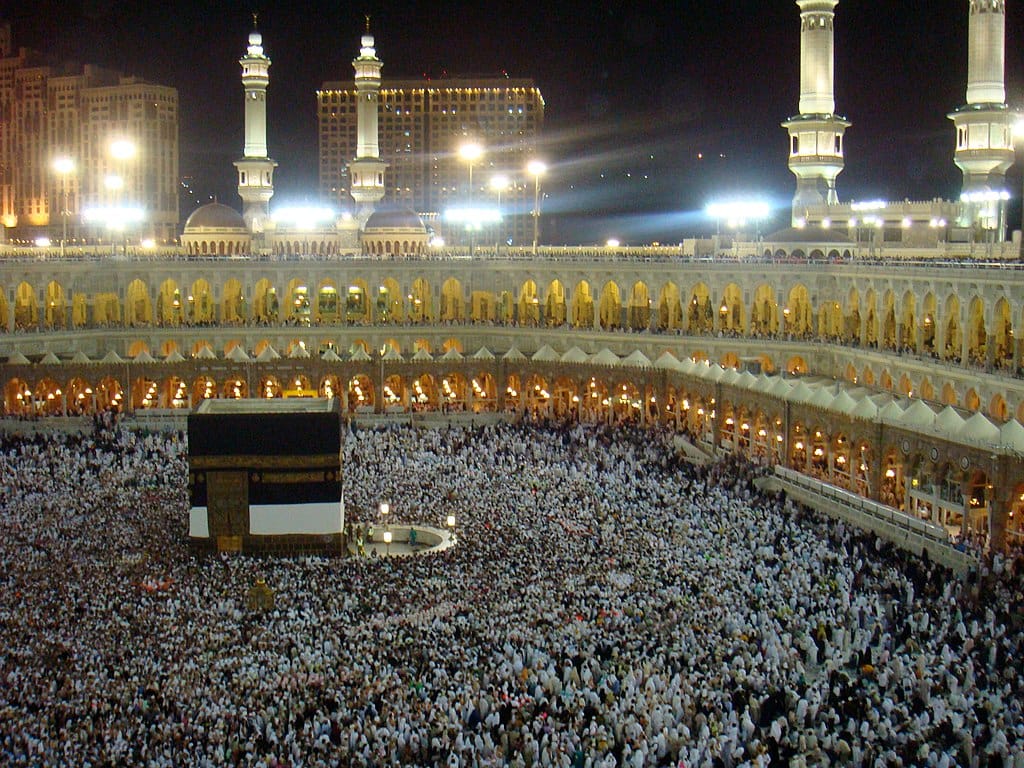Mecca

Mecca is a place name, a toponym, that has acquired a figurative meaning over the years. Literally, it is a city in Saudi Arabia, the birthplace of the prophet Muhammad, to which devout Muslims are required to undertake a pilgrimage to at some point in their lives. Figuratively, it is used to refer to any place that attracts a certain group of people or that is the center of their activity, as in, Las Vegas is a Mecca for gamblers or Rodeo Drive is a mecca for shoppers. The pilgrimage metaphor underlying the figurative sense is obvious, but when did the sense develop?
Mecca is a variation on the Arabic name for the city, Makka or Makkah. An earlier name for the city is Bakkah, but in present-day usage that word is generally reserved for the sacred space around the Kaaba within the modern city. The ultimate etymologies of both names are uncertain, but it is thought by many to come from the Arabic mahram (sanctuary) or mihrab (holy of holies), probably originally a reference to the Kaaba.
The figurative use developed in the early nineteenth century. Edward Baines, in his 1817 History of the Wars of the French Revolution, wrote of the conflict between the British East India Company and the Maratha Empire in India:
Colonel Harcourt accordingly proceeded to Jagarnaut, the Mecca of the Hindoos, and on the 18th encamped in the neighbourhood of this metropolis of idolatry, the Pagoda having been previously evacuated by the Mahratta forces.
Here the use is still in a religious context but is not a reference to Islam.
The metaphor became separated from religion within a few years. An anonymous writer, going by the name of Scotus, writes an over-the-top description of the glories of an Edinburgh medical education in the pages of the Lancet in 1826:
As my education, however, proceeded, the prejudices of my youth were further strengthened by a daily communion with the names of authors and books, most of which I traced to a Caledonian origin, every elementary work put into my hands being either composed, revised, or compiled by some luminary of the North, while the magical letters of EDINBURGH, emblazoned at the bottom of each title page, inspired me with a veneration even for its types.
Contracting my progress, what many wiseacres would be pleased to call an idle habit of looking into reviews, journals, and medical biography, the intellectual feats of Scottish Chrichtons recorded in these pages struck my imagination with the force of a scientific romance. Here I ever found the appellation of “nurse of science,” “the modern Athens,” the “cradle of philosophers,” ready at the point of some patriotic pen, to do homage to this land of learning. It was consequently the “Mecca,” the “Delphic Oracle,” the “Vale of Egeria,” to which all studious pilgrims should resort to drink of the pure springs of knowledge; in short, the idol brightened as I gazed, until, purged of all earthly traces of imperfection by the intensity of my admiration, it shone forth at length the true divinity of my worship.
And there is this more recent example, from an account of an exhibition of photographs of the Beatles taken by Paul McCartney in the London Standard of 28 August 2025:
These ones are also for sale, which means the site will probably become a mecca for fans over the next month or so. Many of the frames have been designed by McCartney, which adds to the momentous nature of it all.
Many Muslims consider the figurative use of Mecca to be offensive, and it’s easy to see why, especially when a spiritual practice is associated with such materialistic pursuits like gambling or shopping. To ameliorate this, many style guides recommend using lower case and an indefinite article when using Mecca figuratively, as in the London Standard quotation above, but that doesn’t seem like much of a fix.
Sources:
Baines, Edward. History of the Wars of the French Revolution, vol. 1 of 2. London: Longman, Hurst, Rees, Orme, and Brown, 1817, 451. HathiTrust Digital Library.
Everett-Heath, John. Concise Oxford Dictionary of World Place Names, sixth edition. Oxford: Oxford UP, 2020, s.v. Mecca. Oxford Premium Reference Collection.
Jessop, Vicky. “This Glimpse of The Fab Four Is Really Something.” London Standard, 28 August 2025, 31/1. ProQuest Newspapers.
Oxford English Dictionary Online, June 2011, s.v. Mecca, n.
Scotus. “Sketches of the Medical Schools of Scotland” (10 November 1826). The Lancet, vol. 7, no. 169, 25 November 1826, 254–256: 254/2. HathiTrust Digital Library.
Photo credit: Al Jazeera English, 2008. Wikimedia Commons. Licensed under a Creative Commons Attribution-Share Alike 2.0 Generic license.